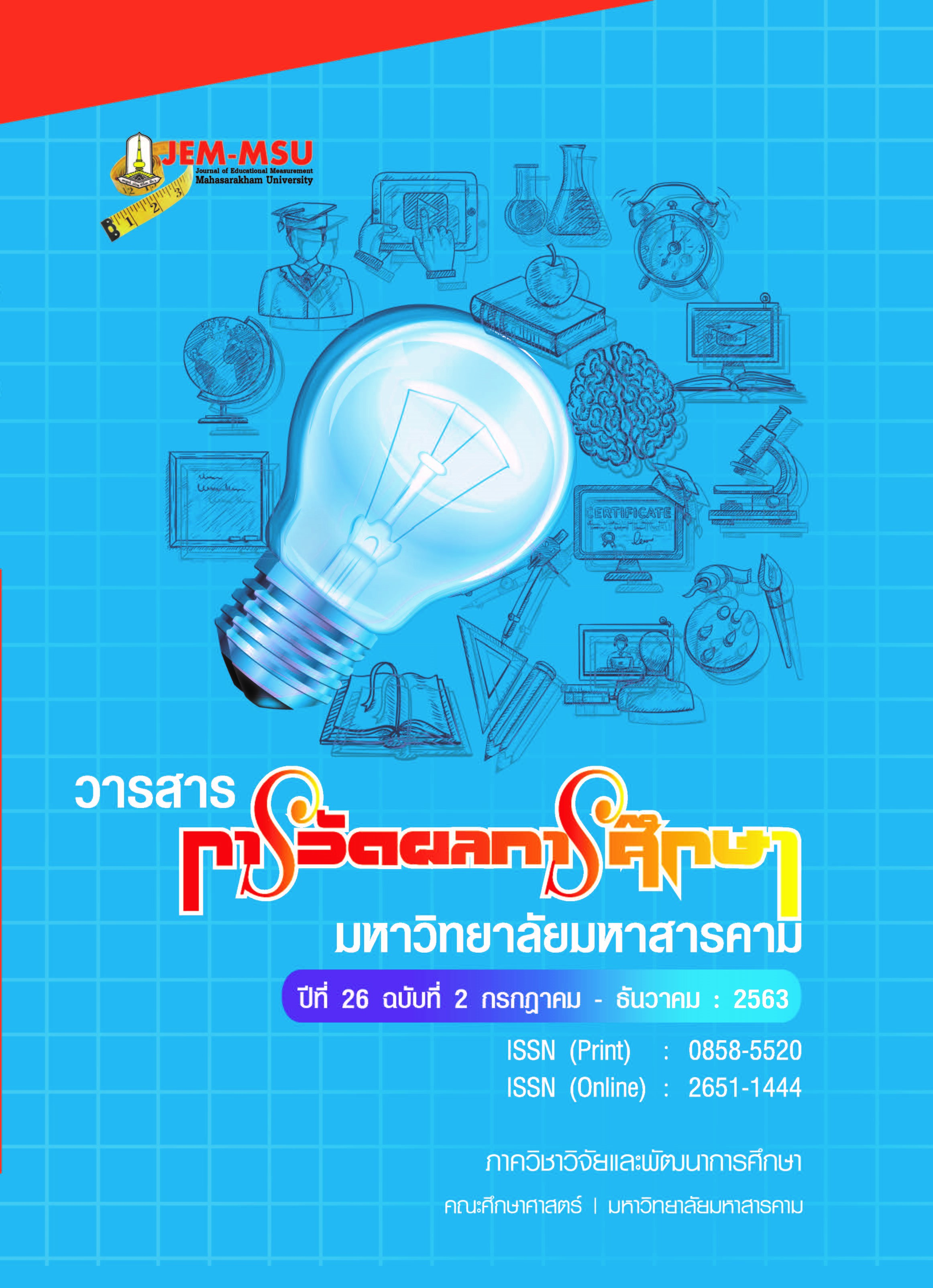Learning Outcomes of Bachelor of Education Curriculum: In General Science Program (Revised Edition B.E. 2560)
Main Article Content
Abstract
This research aimed to study the learning outcomes of the Bachelor of Education Curriculum: in General Science Program (Revised Edition 2017). The informants were 97 first- and second-year students, 5 teachers from the curriculum committee, and 10 lecturers, of the General Science Program. The instruments consisted of: a skill assessment form for assessing students’ skills in 6 areas: virtues and ethics, knowledge, cognitive skills, interpersonal skills and responsibility, numerical analysis, communication and information technology skills, and skills of organizing for learning; and an interview form for teachers from the curriculum committee and lecturers. The quantitative data analysis employed the mean and standard deviation, while content analysis was employed in analyzing the qualitative data from the interviews. The results of the research revealed that, as a whole, the students had their skills at a high level. Ranked in descending order, the skills are listed as follows: cognitive skills, virtues and ethics, knowledge, interpersonal skills and responsibility, skills of organizing for learning, numerical analysis, and communication and information technology skills.
Article Details
The content and information contained in the published article in the Journal of Educational Measurement Mahasarakham University represent the opinions and responsibilities of the authors directly. The editorial board of the journal is not necessarily in agreement with or responsible for any of the content.
The articles, data, content, images, etc. that have been published in the Journal of Educational Measurement Mahasarakham University are copyrighted by the journal. If any individual or organization wishes to reproduce or perform any actions involving the entirety or any part of the content, they must obtain written permission from the Journal of Educational Measurement Mahasarakham University.
References
คณะกรรมการการศึกษาแห่งชาติ. (2545). พระราชบัญญัติ การศึกษาแห่งชาติ พ.ศ.2542 และแก้ไขเพิ่มเติม (ฉบับที่ 2) พ.ศ. 2545. กรุงเทพฯ : บริษัทพริกหวาน กราฟิกจำกัด.
จุฑารัตน์ ศราวณะวงศ์. (2553). การประเมินความพึงพอใจและ ความคาดหวังของผู้ใช้บัณฑิต สาขา สารสนเทศศาสตร์ คณะมนุษยศาสตร์และสังคมศาสตร์ มหาวิทยาลัยขอนแก่น ปีการศึกษา 2545-2548. สารสนเทศศาสตร์, 28(2), 1-16.
ดรุณี รุจกรกานต์. (2553). เอกสารประกอบการประชุม เรื่อง กรอบมาตรฐานคุณวุฒิระดับอุดมศึกษา แห่งชาติ : การนำสู่การปฏิบัติ. วันที่ 21–23 มกราคม 2553. ณ โรงแรมไดมอนด์พลาซ่า อำเภอหาดใหญ่ จังหวัดสงขลา.
วิมานพร รูปใหญ่. (2555). การศึกษาคุณลักษณะบัณฑิตที่พึงประสงค์ตามกรอบมาตรฐานคุณวุฒิระดับอุดมศึกษาแห่งชาติ ของสาขาวิชาบรรณารักษศาสตร์และ สารสนเทศศาสตร์ คณะมนุษยศาสตร์และสังคมศาสตร์. (ออนไลน์). ได้จาก:http//www.boe.human.ubru.ac.th/research/images/research
ศิราณีย์ อินธรหนองไผ่ และจุฑามาศ คชโคตร. (2560). ผลการเรียนรู้ตามกรอบมาตรฐานคุณวุฒิระดับอุดมศึกษาแห่งชาติ ในรายวิชาปฏิบัติการพยาบาลชุมชน หลักสูตรพยาบาลศาสตรบัณฑิต. วารสารพยาบาลตำรวจ, 9 (2), 104-114.
สำนักงานคณะกรรมการการอุดมศึกษา. (2552). กรอบมาตรฐานคุณวุฒิระดับอุดมศึกษาแห่งชาติ พ.ศ. 2552. เอกสารประกอบการประชุมเชิงปฏิบัติการเรื่อง กรอบมาตรฐานคุณวุฒิ: การพัฒนารายละเอียดของหลักสูตรและรายวิชาให้มีคุณภาพ 30 กันยายน – 2 ตุลาคม 2552 ณ โรงแรมเรดิสัน กรุงเทพ.
Joanna Allan (1996). Learning outcomes in higher education. Studies in Higher Education, 21(1), 93-108.
Lambert J and Gong Y (2010). 21st century paradigms for preservice teacher technology preparation. Computers in the Schools, 27(1), 54-70.
Nuangchalerm P. (2017). Preservice teachers’ twenty first century learning skills: Three different majors of study. International Journal of Advanced and Applied Sciences, 4(7), 124-128.
Prachagool V. and Nuangchalerm P. (2017). Twenty first century learning skills of non-teaching license teachers. Journal of Educational Administration and Supervisor, Mahasarakham University, 8(2,) 7-14.
Robin, B. R. (2008). Digital storytelling: A powerful technology tool for the 21st century classroom. Theory into practice, 47(3), 220-228.


